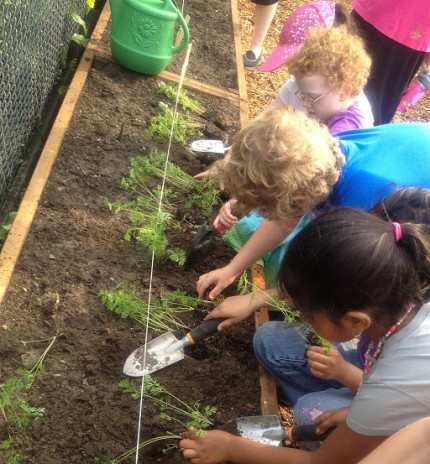Member Profile: Halton Food for Thought
Posted: January 30, 2013
Categories: Featured Edible Education Network Members / Food in the News / Good Food Ideas for Kids / GoodFoodBites / Member Profiles / News from Sustain Ontario / Schools
We know that students who arrive at school hungry do not perform well in the classroom; one can easily see how this fact could create a downward spiral leading to other issues in those children’s lives. Halton Food for Thought works to address this issue starting at the root cause.
Halton Food for Thought (HFFT) first formed in 1997 as an advisory committee in response to the prevalent issue of children coming to school undernourished, with a handful of breakfast programs starting that year as stand-alone volunteer-driven programs. Since then, HFFT has developed and grown into much more, working to inspire children and youth to make healthy food choices vital to their development by providing inclusive access to nutritious foods throughout the school day while working with stakeholders to ensure the sustainability of and responsibility for student nutrition programs in Halton schools. HFFT strives to have a student nutrition program in every school, thus improving the learning capacity, health, and well being of all children and youth within the Halton Region.
 At its beginning, HFFT received funding from what is now called Community Development Halton, and hired a coordinator who began implementing more formalized breakfast programs with the ability to give funding to schools to support food purchases. Gayle Cruikshank, now the Executive Director of HFFT, first got involved in 1998 when she attended a presentation at her daughter’s school. Gayle then began a healthy snack program and was invited to sit on the advisory committee.
At its beginning, HFFT received funding from what is now called Community Development Halton, and hired a coordinator who began implementing more formalized breakfast programs with the ability to give funding to schools to support food purchases. Gayle Cruikshank, now the Executive Director of HFFT, first got involved in 1998 when she attended a presentation at her daughter’s school. Gayle then began a healthy snack program and was invited to sit on the advisory committee.
HFFT has come a very long way since those early days. When Gayle took on more of a leadership role in 2002, HFFT had approximately 23 programs running. Today, they have 146 programs at 104 locations. HFFT has grown substantially since 2005 when the Ministry of Children and Youth Services took over their direct funding through their regional offices, allowing them to incorporate and achieve charitable status in 2007, in turn enabling them to seek more grants and donors. Gayle shares, “I believe it is a community responsibility to ensure our children and youth have the nourishment needed to be the best they can be.”
HFFT obtains the food for the schools through a variety of sustainable methods: they partner with two vendors, allowing each school to order online and receive direct delivery. The items are at a reduced price due to their purchasing power. They also have a food vendor program that allows them to purchase items directly from the manufacturer and have it delivered to their ‘Refresh Foods’ warehouse where they recover foods and redistribute them to food security agencies (22 member agencies are involved, including food banks, church dinners etc). They also profit from some donations, as long as they adhere to the nutritional guidelines set out by the Ministry.
Halton Food for Thought also has several programs (a breakfast program, morning boost, a healthy basket program, edible school gardens etc) including a Farm to School program that connects schools with local farmers to promote local eating. The Farm to School program has an impressive 21 schools on board with the hope to expand to 30 within the next year. These schools receive an 8-10 week delivery of fresh local farm food in the Fall. This past year, 7,341 students were served fresh food at a cost of 0.54 cents per student. They also send the schools weekly educational items that correspond with the food item being sent that week (colouring sheets, food facts, newsletter blurbs, PA announcements etc).
Of course, such influential and supportive work for a community provides rewarding outcomes that can often be witnessed first-hand. One specific example is the troubled grade 11 student who lived in low-income housing and was skipping several classes, and so ended up being placed in a co-op with the school cafeteria after meetings with him revealed he had a great interest in food. He enjoyed and attended the co-op every day, so much that he went on to apply to a culinary skills program at college, all because of an interest and passion that the Food for Thought program initiated. HFFT has other memorable daily instances too that point to the importance of these programs, such as the young boy who didn’t recognize a cucumber, or the young girl who had never tasted a banana before and loved it. This exposure causes some children to even start asking for these items at home.
Halton Food for Thought’s programs and initiatives have evidently made a broad positive impact on the community of Halton, educating children on healthy choices and providing students with these healthy food choices, while also including local food support in the progress!
By: Josie Di Felice


